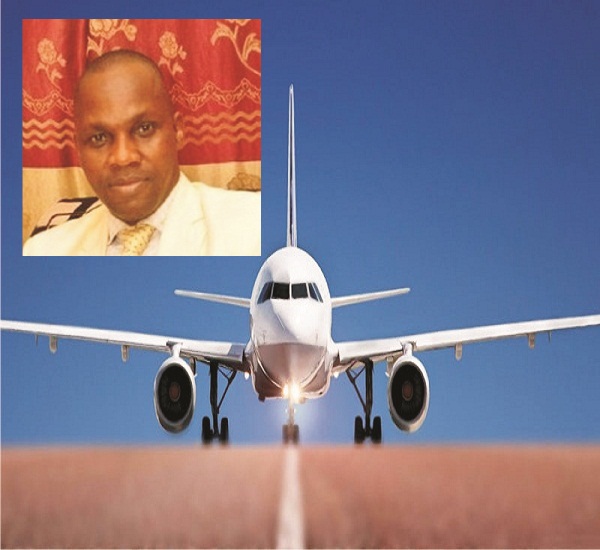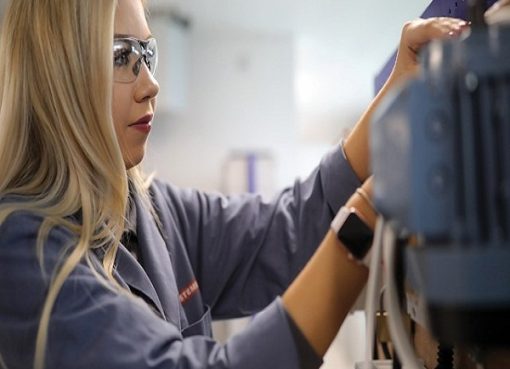Engr Patrick Achurefe, a graduate of mechanical engineering of the University of Benin is a quality and safety expert and has earned years of experience in the aviation sector. He is the current National Chairman of Aeronautical Division of the Nigerian Society of Engineers. He shared his thoughts with our correspondent on some issues in the sector during the technical lecture held recently on “corrosion” in Lagos.
What was the aim of putting together this technical lecture on corrosion in the aviation industry?
What we intend to achieve is safety in the aviation industry. In this seminar we did on corrosion, you must have noticed that it cuts across every activities that happen in the aviation industry for the aircraft engineer, for the aerodrome engineer that takes care of the road, the avionics engineer that takes care of the equipment of the aircraft, for the I.T technician that has to do with the Air Traffic Controller (ATC) equipment’s for communication – it cuts across. For instance, if a pilot cannot communicate with the ATC, it is a hazard and corrosion sets-in in that area. So if every unit in the aviation industry knows and they tackle it on time, the effect of corrosion that may cause serious damage or cause a discontinuity in the process of operation, when quickly intercepted, and removed would ensure safety. In this industry, we are all expected to see ourselves as working together and so whatever you do or do not do, can affect the other person. So, the aim of this lecture is that everybody in the sector of the aviation industry will know what corrosion is and start working to prevent it – like mitigation before it becomes a catastrophe.
Is there specialized training for engineers in the aviation sector to handle corrosion?
As it is now, I would not say there are specialized training, like what the professor said, yes they might have for the academic level but for the aviation industry except you go out of the country or you invite the experts to come and facilitate the training, there is none. These are also part of the things we lack in the industry – training, because training is an essential or integral part of the aviation industry, without it, one cannot move ahead. That is why we enforce it and training records of operators or personnel are also requested in situations where they want to renew AOC certificate. The challenges in training is that there are not enough training schools or organization that can handle some specifics, for example, this corrosion, I have never come across anyone that trains on it here, but we can contact experts outside the country and send one or two people on the team who would learn and come and teach others or the experts are brought over here.
What are some of the problems caused by corrosion in the aviation industry in Nigerian – and are we paying enough attention?
In this area, I am not an expert but there is a ‘Corrosion Preventive Program’ to be done for every aircraft, produced by the manufacturer. Every operator is expected to follow this program judiciously and most of the corrosion program fall into when they are doing the major check, so when the aircraft goes out for this, they strip the aircraft down, and check for corrosion because some take a longer amount of time, maybe two years from the program or after a particular period of flight it has undertaken, which has been imputed in the maintenance program.
What are the challenges in the aviation sector from your perspective as the national chairman of the aeronautical division of the Nigerian Society of Engineers (NSE)?
There are numerous challenges but one of the challenges plaguing the aviation industry is where they do their maintenance, as most of the major ones are done outside the country. This means that a lot of revenue will be spent in terms of dollar rates – if such maintenance is done in Nigeria, we would see that even operators would not complain. When it comes to major checks, there is no provision to do a major check in Nigeria so they fly it out of the country where they have to spend a lot of money. The other challenges the industry is facing especially in relations to the operators is that even when they are in urgent need of spare parts, maybe on AOG, by the time it arrives in the country it gets stuck with customs and clearing can take up to one or two weeks, this is a big challenge. In the country presently, we cannot do night flights because there are numerous facilities in the airports that are not serviceable, so we only run day flights – visual flights instead of night travels. This results in under-utilized aircraft which is different from what obtains in other parts of the world where they fully utilize their planes with night flights. In Nigeria, we have some airports that stop operating between 6 pm and 7 pm and this has been some of the challenges which are affecting the aviation industry. In terms of infrastructure, though some renovations and constructions are being done, it has been an issue for the sector.
What are the problems with infrastructure and viability of airports in Nigeria in your own opinion?
Well, the problem with infrastructure presently that I have seen is one – depending on the people that are putting the infrastructure together, are we putting the right infrastructure in place? Because we also have to speak to ourselves – corruption is everywhere, we know but when those infrastructures are not properly put in place, there is a problem. Well, the federal government is doing a lot by trying to upgrade all airports to have enough facilities for the operators, individually because in the past two, three airlines sometimes might not have storage space for their equipment and this has been a big challenge. For some other airlines, they have a lot of aircraft but not enough space to park them and at the end of the day, the whole place becomes clumsy. The federal government has a lot to do to assist the operator even though we do not have a national carrier, the individuals striving to operate an airline should be encouraged, as sometimes these operators have to provide these facilities for themselves by building their hangers, just to provide some level of comfort and efficiency for their operations.
What would you say are the risk of both customers and staffs facing in this industry?
When you talk about risk, to be sincere with you, flying is one of the safest means of transportation but the risk comes in when at the point one wants to make use of the machine and cannot, it affects the customers. These customers might include individuals that have made bookings already but on getting to the airport they are informed that the flight has been cancelled or for operational reasons, the aircraft cannot go. Some equipment like scanners are not sufficient to cater to all the users and this poses its own risk. We all know that there are natural risk factors such as the weather, but some customers do not want to be bothered with this, they just want to get to their destination fast.
What regulations and policies are in place to ensure quality delivery of services and to moderate competitive prices between players?
Government has the policies through the NCAA and in the regulation we have the customer protection that covers users in instances when flights are cancelled or delayed, some benefits go to the customers. So these policies are in place but the real issue is implementation. For prices, the policies are in place, like in the Nigerian Civil Aviation Regulation they have a policy that states how pricing should be done. Even when prices need to be changed, operators have to inform the authorities who would look into the reason that brought about that change. These things are regulated with events that happen at a particular time.
In line with what you just explained, what are the reasons for the over-priced flight ticket system in Nigeria – we are one of the countries that pay a lot for air tickets?
One of the reasons is that the facilities that should have been provided to aid operations are not available. If an operator is the one to provide shuttle transport for passengers to and from their planes or departure – that should have been provided by the agency responsible, it would cost some money. In terms of maintenance also, the expenditure for this outside the country is very huge, but if they maintain in the country, provided that the facility is there, they would spend far less to do the same job. Another reason for tickets being on the high side is fuelling – JET A1, like last week it was very scarce, from Abuja there was no fuel, how would they do it – going to Abuja and coming back. This also causes delay for passengers but in the interest of those who had bought tickets, some airlines have to take fewer loads in other to carry enough fuel that would allow the aircraft come back from the next station. At the end of the day, it is a matter of – if you want to travel, you have to pay for it.
Do you believe that the best is being done to prevent plane crash – preventive measures for the issues that come with flying an aircraft and the issues that affect the aircraft itself?
Well, in that area, we are doing what we feel we can do but much emphasis is being laid on the personnel, which brings me back to training because at times the machine may be okay and airworthy but the person flying it – is the person capable? Is the person experienced on that type? These are the things we look at. Looking at the Safety Management System (SMS) that has been introduced now which talks about training for mitigation against some accident because research has proven that most of the time the incident that happens is not the aircraft, they are preventable, some of them are human – poor decision making. The machine is computerized; all they have to do is follow instructions. For now, everyone is trying hard that is why every six months, the pilots must go for simulator training, no matter what it is, to show competency in flying that type of aircraft. We still encourage that more should be done and everybody’s hand must be on deck for safer aircraft and safer flights.










